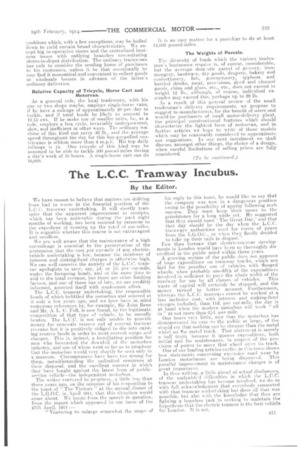The L.C.C. Tramway Incubus.
Page 5

If you've noticed an error in this article please click here to report it so we can fix it.
By the Editor.
We have reason to believe that matters are drifting from had to worse in the financial position of the L. C. C. tramway undertaking. It will shortly transpire that the apparent improvement in receipts, whieh has been noticeable during the pact eight months of working, has been secured by recourse to the expedient. of running up the total of car-miles. It is arguable whether this course is not extravagant and needless.
We are well aware that the maintenance of a high car-mileage is essential to the. preservation of the pretension that the cost per car-mile of any electricvehicle undertaking is low, because the incidence of interest and sinking-Fund charges is otherwise high. We can well conceive the anxiety of the L.C.C. tramcar apologists to save, say, Id. or c1. per ear-mile, under the foregoing heads, and at the same time to add to the total revenue, but there are other limiting factors, and one of these has of late, we are credibly informed, asserted itself with unpleasant effect.
The L.C.C. tramcar undertaking, the responsible heads of which belittled the motorbus and sneered at it only a few years ago., and we here have in mind numerous references by, for example, Sir John Benn and Mr. A. L. C. Fell, is now found, by the legitimate competition of that type of vehicle, to be. soundly beaten. The L.C.C. is not only unable to provide money for renewals reserve out of cur-rent tramcar revenue but it is positively obliged to dip into existing reserve funds in order to meet current outgo and charges. This is, indeed, a humiliating position for men who forecasted the downfall of the motorbus industry, and one of whom went so far as to prophesy that the motorbus would very shortly he seen only in a museum. Circumstances have been too strong for them, notwithstanding the unlimited resources at their disposal, and the excellent manner in which they have fought against the latest form of publicservice vehicle—the independent motorbus. The writer ventured to prophesy, .ii little less than three years ago, on the occasion of his responding to the toast of " The Visitors " at the annual dinner .tif the L.G.O.C. in April 1911, that this situation would come about. We quote from the speech in question, from the report which appeared in our issue of the 27th April, 1911 :— "Venturing to enlarge somewhat the scope of his reply to this toast, he would like to say that the company was now in a dangerous position owing to the possibility of apathy following such success. They must keep their noses to the grindstones for a long while yet. He suggested that they should toast ' The Great. Day,' and that that day should be the day when the L.C.C. tramways authorities sued for terms of peace from the L.G.O.C., or when they finally decided to Lake up their rails in disgust." Few then foresaw that electrie-tramcar developments in London would have boon so thoroughly discredited in the public mind within three years. A growing section of the public does riot approve of huge expenditure on tramway tracks, which are laid for the peculiar use .of vehicles with flanged wheels, when probably one-fifth of the expenditure involved is sufficient to pave the whole width of the roadway for use by all classes of vehicles. This waste. of capital will certainly he stopped, and the money turned to better account. Furthermore, whereas the L.C.C. trameals cannot be worked at a less inclusive cost, with interest and sinking-fund charges included, than 11d, per car-mile, the day is at hand when the modern motorbus will work " all in" at not more than 6!,d. per mile.
One hears very little, now that the motorbus has demonstrated its ease to the public at large, of the stupid cry that nothing can be cheaper than the metal wheel on metal track. That statement is merely a. half truth, because it ignores expenditure, both initial and foe maintenance, in respect of the provision of power to move that wheel ueen its track. One of our leading articles earlier in this issue shows how statements concerning excessive road wear by London motorbuses are being disproved. This parallel improvement in. maintenanee charges is of great importance. In thus writing, a little ahead of actual disclosures, of the undoubted difficulties in which the L.C.C. tramcar undertaking has become involved, we do so with Full acknowledgment that everybody connected with that tramcar mudertaking has done all that was possible, but also with the knowledge that they are fighting a hopeless task in seeking to maintain the hypothesis that the electric tramcar is the best vehicle for London. It is not.






















